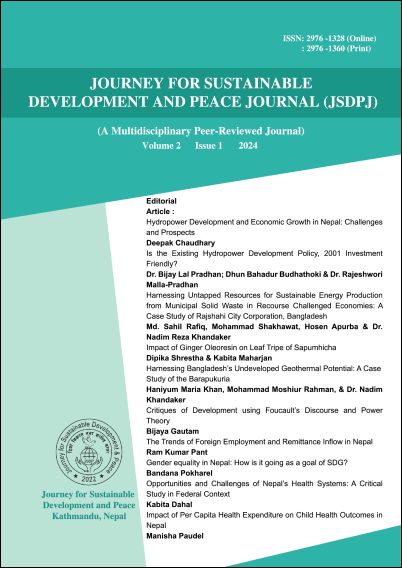Is the Existing Hydropower Development Policy, 2001 Investment Friendly?
DOI:
https://doi.org/10.3126/jsdpj.v2i1.63238Keywords:
Hydropower Development Policy (HDP) 2001, Power Purchase Agreement (PPA), term of project, investment friendly, policy environment, policy advocacyAbstract
Nepal is endowed with an abundance of hydro resources. Its gross hydropower potential is estimated to be 83,290 MW technically. Out of which, 42,133 MW is ascertained as economically exploitable. However, in the span of 112 years, only around 2,900 MW is harnessed. It is obvious that the development of hydropower is a public policy-related matter. Previous studies exhibit several complications in hydropower development policy, 2001 such as private sector participation in electricity trade, lack of one window system, term of project, hedging mechanisms, foreign direct investment, and so forth. In this regard, this study aims to investigate its efficiency and effectiveness through quantitative research design. Herein, for the sake of empirical research three independent variables namely, Financial Incentives Sufficiency (FIS), Return on Investment Sufficiency (RoIS), and Market Access Sufficiency (MAS), and one dependent variable namely, Investment Friendliness (IF) was dealt. To collect the opinion of respondents a set of questionnaires comprising 11 questions was developed and approached to 108 informants from 25 diverse sectors of the hydro-industry. Herein, deductive reasoning was persuaded. For analyzing data, statistical tools such as arithmetic mean, standard deviation, factor analysis, Chi-Square tests, Mann Whitney "U" test, and Kruskal-Wallis "H" test were computed. Based on empirical analysis this study concludes that the hydropower development policy, of 2001 is investment-friendly. However, the study manifested a number of rooms that were to be addressed as changing the expectations of investors. On this ground, the findings of this study will be applicable with a view to formulating a more investment-friendly hydropower policy in the future.
Downloads
Downloads
Published
How to Cite
Issue
Section
License
This license enables reusers to distribute, remix, adapt, and build upon the material in any medium or format for noncommercial purposes only, and only so long as attribution is given to the creator.




